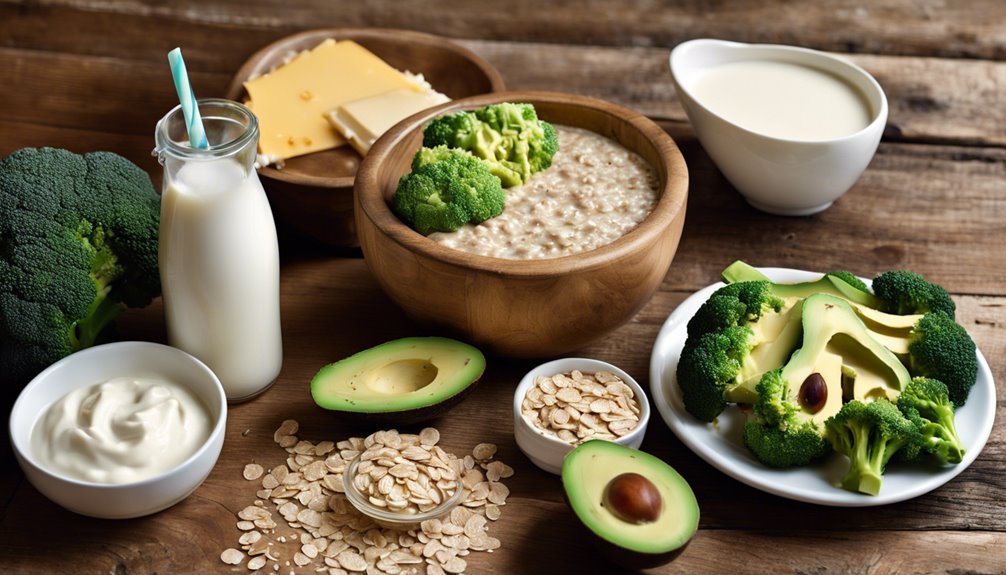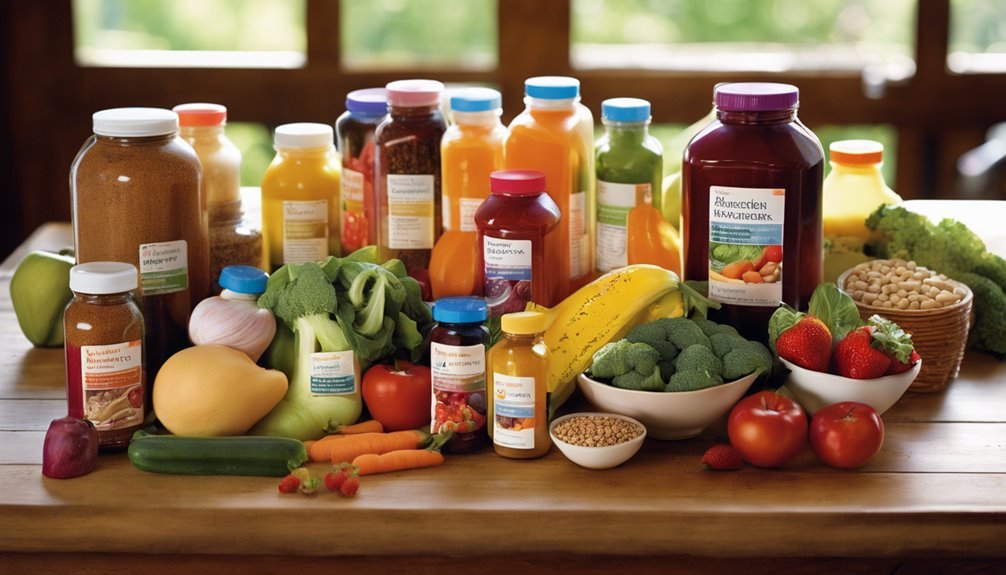As a nursing mom, you're probably wondering how to adjust your diet to best support your baby's health and your own. It's crucial to focus on foods rich in essential nutrients like calcium, iron, and omega-3 fatty acids. But have you considered how certain foods might affect your baby through breast milk? Some ingredients can enhance milk production and improve its quality, while others might lead to discomfort or allergic reactions in your infant. Identifying which foods to embrace and which to avoid can significantly impact your nursing journey. But, where do you start, and what exactly should you include or exclude from your diet?
Key Takeaways
- Include calcium-rich foods like dairy and kale to support bone health in both mother and baby.
- Opt for iron-rich choices such as spinach and red meat to boost energy and prevent anemia.
- Incorporate essential fatty acids from sources like salmon and walnuts to aid in baby's brain development.
- Plan meals around hydration, aiming for about 13 cups of fluids daily, with a focus on water and herbal teas.
- Avoid high-caffeine and spicy foods that may disturb the baby's sleep or cause discomfort.
Understanding Breastfeeding Nutrition
While breastfeeding, your nutritional choices play a crucial role in both your health and your baby's development. Opting for a balanced diet enhances breastfeeding benefits, supporting your infant's growth and fortifying your own well-being.
This isn't just about the physical nourishment; it's deeply tied to your maternal mental health as well.
You're not just eating for two; you're nurturing two. The meals you choose can influence your energy levels and mood, both of which are vital during this demanding phase.
It's crucial to integrate foods that not only cater to your physical needs but also help manage stress and boost your mood. This mindful approach to eating while breastfeeding can lead to a more fulfilling and emotionally stable period during the early months of motherhood.
Key Nutrients for Lactation
Building on the importance of a balanced diet during breastfeeding, it's important to focus on specific nutrients that support lactation and enhance the quality of your breast milk. Key components include calcium, iron, and essential fatty acids, which are crucial for both your health and your baby's development.
Calcium is vital for your baby's bone development and is transferred through your milk. It's important to consume adequate calcium sources to maintain your own bone density. Iron helps prevent anemia in both you and your baby. Iron-rich foods not only boost your energy levels but also ensure that your baby's oxygen supply is optimal. Essential fatty acids, particularly omega-3s, contribute to your baby's brain development.
Here's a guide to help you include these nutrients in your daily diet:
| Nutrient | Sources | Benefits |
|---|---|---|
| Calcium | Dairy, fortified plant milk, kale | Supports bone health, milk quality |
| Iron | Red meat, spinach, lentils | Boosts energy, prevents anemia |
| Omega-3 Fatty Acids | Flaxseeds, walnuts, fish | Enhances brain development |
Incorporating these into your meals ensures you're not only nourished but also providing the best for your baby. Remember, every nutrient counts when you're nourishing a new life.
Superfoods for Milk Production

To boost milk production effectively, consider incorporating superfoods known for their lactogenic properties into your diet. Foods like oats, almonds, and spinach aren't just delicious; they're also packed with essential nutrients that can help enhance your milk supply.
Oats, for instance, aren't only comforting but are also high in fiber and iron, which are crucial for lactation boosting.
Almonds are a powerhouse of calcium and protein, vital for both maternal and infant health. A handful of these nutrient-rich foods can make a significant difference in your daily routine.
Spinach, rich in iron, calcium, and folic acid, supports lactation and aids in replenishing the body's needs during breastfeeding.
Don't forget about other beneficial foods like salmon and legumes. Salmon is an excellent source of omega-3 fatty acids, which are important for your baby's brain development and can also help increase your milk production.
Legumes, including lentils and chickpeas, are high in protein and fiber, making them an ideal choice for nursing moms looking for sustainable energy and lactation support.
Incorporating these foods into your meals not only supports milk production but also ensures that you're consuming a balanced, nutrient-rich diet.
Hydration and Breastfeeding
Often overlooked, staying adequately hydrated is crucial for breastfeeding mothers. Remember, when you're breastfeeding, your body's fluid needs increase to maintain milk production. It's recommended that you consume about 13 cups (around 3 liters) of fluids a day. This might sound daunting, but there are simple hydration tips to help you meet your fluid intake needs.
Firstly, make water your best friend. Keep a bottle handy at all times, particularly when you're nursing or pumping, as this is when you lose a significant amount of fluid. Don't wait until you're thirsty to drink; thirst is a sign that you're already starting to dehydrate.
Incorporating a variety of beverages can also aid in meeting your hydration goals. Think beyond water—milk, herbal teas, and clear broths contribute to your daily fluid intake while also offering a comforting variety.
However, it's wise to limit caffeinated drinks as they can contribute to dehydration.
Lastly, listen to your body. If you're feeling dizzy, fatigued, or notice that your urine is dark in color, it's a signal to increase your fluid intake. By keeping hydrated, you're not only supporting your milk production but also your overall health.
Dietary No-Nos for Nursing Moms

While nursing, it's essential to avoid certain foods and beverages that can affect your baby's health and your milk supply. Caffeine consumption should be moderated because it can make your baby irritable and disrupt their sleep patterns. Similarly, spicy foods might be passed through your milk and could cause discomfort or fussiness in some sensitive infants.
It's not just about what you eat, but how it affects your baby. Here's a quick guide to help you navigate through dietary choices:
| Food Type | Reason to Avoid |
|---|---|
| High-caffeine items (e.g., coffee, energy drinks) | Can cause baby restlessness and sleep issues |
| Spicy foods (e.g., hot peppers, heavily spiced dishes) | May lead to baby discomfort or colic |
| Alcohol | Can impair baby's development and affect milk production |
Allergens and Baby's Health
Shifting focus from specific harmful foods to broader dietary concerns, it's important to also consider potential allergens that might affect your baby's health. Developing allergen awareness can help you monitor and manage any signs of baby's reactions to foods you consume. Common allergens include dairy, eggs, nuts, and soy.
While not all babies are sensitive to these, watching for symptoms like fussiness, rashes, or digestive issues after nursing can guide your dietary choices.
It's essential to introduce potential allergens gradually and one at a time. This strategy not only helps in identifying triggers but also in potentially reducing the risk of developing allergies.
If you notice any adverse reactions, it's advisable to consult with your pediatrician or a dietitian who can provide guidance based on the latest evidence.
Organic Choices for Breastfeeding

Choosing organic foods during breastfeeding can contribute positively to your baby's health and your own well-being. Opting for organic baby food and ingredients sourced from sustainable farming practices ensures that what you consume is free from harmful pesticides and chemicals. This is crucial because what you eat directly influences the quality of your breast milk and, consequently, your baby's development.
Organic foods are often richer in certain nutrients, including antioxidants. Research suggests that these nutrients can enhance immune function and potentially reduce the risk of infections in both you and your baby.
By consuming organic products, you're also supporting sustainable farming methods that are better for the environment. This approach minimizes your carbon footprint and fosters a healthier planet for future generations.
Moreover, choosing organic can help ensure that the foods you eat are non-GMO and preserved without aggressive chemicals. While organic options might come at a higher price point, the benefits they offer are a worthy investment in the long-term health of your family.
Vegan Diets and Nursing
Adopting a vegan diet while nursing can be both nutritious and fulfilling, provided you carefully manage your intake of essential nutrients. As a nursing mom, your body requires ample protein, calcium, iron, and vitamins to ensure both you and your baby thrive.
Vegan protein sources like lentils, chickpeas, quinoa, and tofu are excellent for maintaining your energy levels and rebuilding tissues. It's crucial to incorporate a variety of these proteins to cover all essential amino acids.
Equally important is your calcium intake, which supports your baby's skeletal development. Opt for plant-based calcium from fortified plant milks, tahini, almonds, and leafy greens such as kale and bok choy. These not only offer calcium but also provide other vital minerals and vitamins.
Remember to complement your diet with vitamin B12, typically found in fortified foods or supplements, as it isn't naturally abundant in plant foods.
Also, ensure adequate intake of omega-3 fatty acids, which can be sourced from flaxseeds, chia seeds, and walnuts, to support your baby's brain development.
Meal Planning Tips

When planning your meals, it's essential to balance convenience with nutritional value to meet both your needs and your baby's. Start by focusing on nutrient-dense foods that provide the vitamins and minerals crucial for your recovery and your baby's development. Incorporate a variety of proteins, whole grains, and fresh fruits and vegetables.
Planning these meals ahead of time can significantly ease your daily routine. Consider dedicating a few hours each week to meal prep. This involves preparing large batches of meals that can be easily divided and stored.
Utilize food storage techniques to keep these meals fresh and nutritious. Glass containers can be a great option as they don't harbor bacteria and are easy to clean and reuse. Labeling these containers with dates and contents will help you keep track of what you have and ensure you're rotating through dishes efficiently.
Snacks for Energy and Nutrition
Snacks packed with nutrients can significantly boost your energy levels and contribute to your overall nutrition, especially during the demanding postpartum period.
As a nursing mom, your body requires extra calories and nutrients to maintain your health and support your baby's growth. Incorporating energy bars and nutrient smoothies into your diet can be a practical way to meet these needs.
Choose energy bars that are low in sugar but high in protein, fiber, and healthy fats. These will give you a sustained energy boost without the crash that comes from sugary alternatives.
Look for bars containing nuts, seeds, and whole grains to maximize the benefits.
Nutrient smoothies are another excellent option for a quick, nutritious snack. Blend a mix of fruits, vegetables, and a protein source like Greek yogurt or a scoop of protein powder.
Adding a handful of spinach or kale can increase the vitamin content without altering the taste significantly.
Supplements for Breastfeeding Moms

As a breastfeeding mom, you might wonder if you need supplements to ensure your baby receives all the necessary nutrients. It's important to consider which specific nutrients you might be lacking in your diet and choose supplements that address those needs.
There are several key supplement types you should know about. Firstly, vitamin D is crucial, as it supports your baby's bone development and immune function. The American Academy of Pediatrics recommends a daily intake of 400 IU for breastfed babies, which you can take yourself to pass through your milk or give directly to your baby.
Secondly, omega-3 fatty acids, particularly DHA, are important for your baby's brain development. If your diet is low in sources like fish, a supplement might be beneficial.
Iron is another supplement to consider if your levels are low, but it's best to check with your healthcare provider before starting, as excessive iron can be harmful. The dosage guidelines for iron can vary, but generally, a low-dose supplement is sufficient unless a deficiency is diagnosed.
Always consult with a healthcare professional before starting any new supplement to ensure it's necessary and to receive personalized dosage guidelines.
Cultural Foods and Lactation
Exploring cultural foods can significantly enhance your lactation experience, offering both nutritional and emotional benefits.
Around the world, cultural breastfeeding practices include a variety of traditional lactation foods that are believed to boost milk production and overall health. These foods aren't only packed with essential nutrients but are also part of the shared wisdom passed down through generations, providing you with a connection to your heritage and a comforting sense of belonging.
Here are some noteworthy traditional lactation foods to consider:
- Fenugreek seeds: Widely used in Indian cooking, these seeds are known for increasing milk supply.
- Oatmeal: A common staple in Western diets, oatmeal is easy to prepare and rich in iron.
- Ginger: Used in Asian cuisines, ginger can enhance milk flow and improve digestion.
- Garlic: A versatile ingredient in many cultures, garlic is reputed to boost lactation.
- Sesame seeds: Popular in Middle Eastern diets, these seeds are high in calcium, which is vital for nursing mothers.
Incorporating these foods into your diet can provide a balanced array of nutrients, support your lactation, and allow you to experience the nurturing wisdom of generations.
Frequently Asked Questions
Can Breastfeeding Help With Postpartum Weight Loss?
Yes, breastfeeding can aid in postpartum weight loss by increasing caloric expenditure.
When you nurse, your body burns extra calories to produce milk, which can help with weight management.
However, it's important to maintain a balanced diet rich in nutrients to support both your health and your baby's needs.
Remember, weight loss should be gradual, focusing on long-term health rather than rapid changes.
Always consult a healthcare provider to tailor advice to your specific situation.
How Does Breastfeeding Impact Maternal Mental Health?
Breastfeeding can be a beacon of light for your mental health, illuminating your postpartum journey.
Studies show that breastfeeding benefits your emotional well-being by releasing oxytocin, often called the 'love hormone,' which alleviates stress and enhances bonding with your baby.
This nurturing process not only nourishes your baby but also brings a balanced sense of peace and satisfaction to your mind, offering a natural buffer against postpartum depression and anxiety.
Are There Benefits to Extended Breastfeeding?
Yes, there are significant benefits to extended breastfeeding.
You'll find that it offers exceptional nutritional benefits, as breast milk adapts to meet your baby's evolving needs.
Additionally, it strengthens emotional bonding, providing comfort and security to your child.
Extended breastfeeding also supports your child's immune system and contributes to healthy physical and emotional development.
Embracing this practice can enrich your parenting experience, deeply nurturing your child in these crucial early years.
What Local Resources Support Breastfeeding Mothers?
To find local breastfeeding support, you can start by checking hospitals and clinics for lactation consultants.
Many community centers and health departments also offer free breastfeeding classes and groups led by experts.
Additionally, online platforms and social media have numerous local groups where you can connect with other breastfeeding mothers for advice and encouragement.
These resources are crucial for effective support, ensuring you receive both practical help and emotional encouragement throughout your breastfeeding journey.
How Does Breastfeeding Affect Sleep Patterns?
Breastfeeding can influence your sleep patterns significantly. Hormonal changes and the demands of feeding can lead to sleep deprivation, making you feel more exhausted than usual.
It's important to ensure you're getting balanced nutrition to help manage these changes. Try to rest when your baby sleeps and seek support when needed.
A well-nourished body can better cope with the challenges of new motherhood and disrupted sleep schedules.
Conclusion
You might worry that following a specialized diet while breastfeeding is too restrictive, but it's really about balance and enrichment. Incorporating diverse, nutrient-rich foods enhances your health and supports robust milk production for your baby. Remember, every bite counts towards nourishing both of you. Stay hydrated, choose wholesome snacks, and consider culturally familiar foods that bring comfort and nutritional benefits. Embracing this diet can profoundly impact your breastfeeding journey and your baby's well-being.




